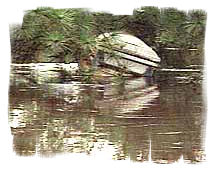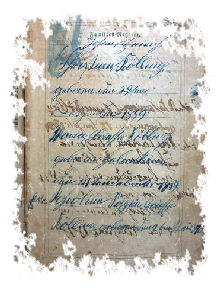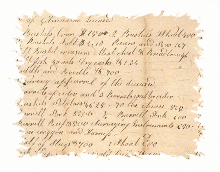Help Save Records Damaged By Hurricane Katrina And Stress The
Importance Of Digital Records To Your Local Societies
 The USGenWeb Archives Project offers a way to preserve documents and photos from being permanently lost when tragedy strikes. By encouraging any and all people to transcribe and digitize important historical documents, including historical and genealogical societies, the USGenWeb, along with Rootsweb, can help protect those artifacts, papers, and pictures from loss in the future. The USGenWeb Archives Project offers a way to preserve documents and photos from being permanently lost when tragedy strikes. By encouraging any and all people to transcribe and digitize important historical documents, including historical and genealogical societies, the USGenWeb, along with Rootsweb, can help protect those artifacts, papers, and pictures from loss in the future.
People were not the only "victims" of Katrina. Historical documents, records, photographs, artifacts have been damaged or lost. Cemeteries have been damaged and mausoleums displaced. National news reports on various channels repeat the stories. Little damage was done to New Orleans' legendary cemeteries, a true blessing. In St. Bernard Parish some mausoleums were swept to one end of the cemetery; coffins are still contained within the cemetery because the cemetery was enclosed with walls. This information was reported on LAOrlean-L@rootsweb.com.
Nola.com - The Times Picayne, reported on September 8 that in Plaquemines Parish, east/southeast of Orleans Parish, caskets from the cemetery at St. Thomas Church in Point a La Hache "littered the top of the levee." CNN.com and other news outlets reported that parts of the Jefferson Davis National Cemetery and Beauvoir House in Biloxi, Mississippi suffered moderate damage but that the cemetery did not have coffins rise to ground level. 
The Washington Post (Thursday, September 1, 2005; Page A19) reports that The Park Service's Museum Resource Center sent curators, archaeologists and historians to the area to assess what documents, photos, and artifacts can be retrieved and restored. The emergency team from the National Park Service will begin its work: blotting, washing, drying, straightening and preserving centuries of historical artifacts that tell the story of one of the oldest U.S. cities. The team also plans to work with universities and the residents of New Orleans helping to restore hundreds of years of memories. Subscribers to the LAORLEAN-L list report that The Notarial Archives is under direct control of the City of New Orleans. The city has hired a Swedish company to come in to dry-freeze and restore the records that were on the first floor. The ones that are on the 2nd floor are in a vault and are safe.
 The USGenWeb Archive volunteers have an opportunity to be good neighbors in this crisis by helping to digitize and safely store documents, photographs, records and any other type of historical record that can be salvaged from this disaster. Magazines, newsletters and other printed materials can be scanned and OCR'd and permanently stored. Handwritten materials can be scanned and both the scan and a transcription of the documents permanently stored. The scan preserves the original document; the transcription can be searched with our search engines. Photographs, bible records and more can be handled the same way. Historical and Genealogical societies would be well served to make use of the facilities to make certain that their valuable holdings are safe from the ravages of disasters, weather, time, careless handling, and more. The USGenWeb Archive volunteers have an opportunity to be good neighbors in this crisis by helping to digitize and safely store documents, photographs, records and any other type of historical record that can be salvaged from this disaster. Magazines, newsletters and other printed materials can be scanned and OCR'd and permanently stored. Handwritten materials can be scanned and both the scan and a transcription of the documents permanently stored. The scan preserves the original document; the transcription can be searched with our search engines. Photographs, bible records and more can be handled the same way. Historical and Genealogical societies would be well served to make use of the facilities to make certain that their valuable holdings are safe from the ravages of disasters, weather, time, careless handling, and more.
The USGenWeb Archives Project provides the safest digital storage facility for all historical and genealogical records. The USGenWeb Archives Project is a central, digital library, and is a free resource for researchers. While it is ideal that the data go into the Archives, which provides one search engine for the entire collection, it is possible to set up web sites for records storage. Rootsweb will set up free accounts for any genealogical and historical society that requests space. Volunteers of The USGenWeb Archives Project can help anyone, individuals or groups, to digitize and save their records for posterity.
Photos of tombstones are as important as any other photo. People think if it is "carved in stone", it is forever. In the best of situations, that isn't the case. Older stones are often unreadable due the ravages of time, weather and vandals. One can only imagine what Katrina has done to the stones from the Gulf Region. Imagine the above ground graves in New Orleans. What has happened to them will be revealed in time. A photographic record of those graves and of any others can save them for the future, no matter what nature, time and vandals may do.
The purpose of this article is to encourage volunteers to help out in the effort to save and store records from the Gulf Coast. Contact societies, get the word out to individuals and use any method to let people know the The USGenWeb Project Archives and other USGW volunteers are more than willing to help with this work. It is a good time to remember that natural and unnatural disasters can occur anywhere at any time. Fires and natural deterioration of old paper are two problems that come to mind. We should also concentrate efforts on convincing societies to store records in digital form. As mentioned earlier, The USGenWeb Archives Project is not the only possibility for this storage. Rootsweb will give space to societies who wish to safely store records in a digital format. Furthermore, those storing records on other websites should be encouraged to contribute their transcriptions, scans, and cemetery surveys to the USGenWeb Archives, just incase something happens to them and their sites.
 Many societies are very concerned that if they allow their records to be digitized and placed online, they might lose the fundraising income that they take in from the sale of these records. What we have found is that researchers are MORE likely to purchase books if they can be assured that the documentation they need is contained in the volumes. Most use online copies for search purposes and then buy the books so that they can own the source material. This has turned out to be a very good thing for the societies and for online researchers as well. Please note that any documents stored by us remain the property of the submitter, whether they are a society's records or those of an individual. USGenWeb and Rootsweb make NO claim of ownership and the records stored belong to the original owner. Many societies are very concerned that if they allow their records to be digitized and placed online, they might lose the fundraising income that they take in from the sale of these records. What we have found is that researchers are MORE likely to purchase books if they can be assured that the documentation they need is contained in the volumes. Most use online copies for search purposes and then buy the books so that they can own the source material. This has turned out to be a very good thing for the societies and for online researchers as well. Please note that any documents stored by us remain the property of the submitter, whether they are a society's records or those of an individual. USGenWeb and Rootsweb make NO claim of ownership and the records stored belong to the original owner.
PLEASE, be a good neighbor and help in this important cause. Our historical documents represent the memories of times gone by. Let us all do our part to make certain these records are safely stored and continue to be accessible to future generations. Contact societies and make them aware of the services that USGenWeb and Rootsweb can offer to lessen the chance that these cherished, treasured, and invaluable records will never be lost to us.
|
 HOME
HOME